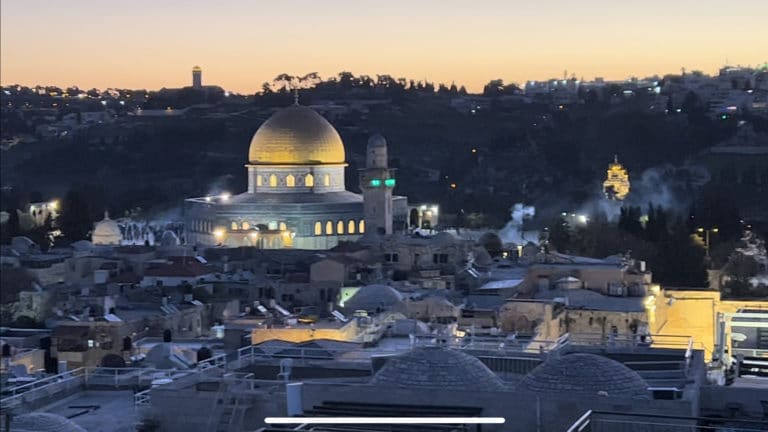
Jerusalem – Hamas militants early Thursday morning fired a salvo of rockets from the Gaza Strip into southern Israel in a move that is being seen as a major escalation in this recent wave of violence that is disturbing the fragile peace in this volatile corner of the world.
Iron Dome aerial defense system in action in southern #Israel after rockets were fired by Palestinian militants. #Gaza pic.twitter.com/5SoL8jvYx2
— Joe Truzman (@JoeTruzman) April 20, 2022
Tensions here in Jerusalem have been slowly rising during the past week, and now what started out as clashes here in this holy city have escalated into a potentially broader regional and diplomatic conflict.
As with all things, this recent wave of violence did not occur in a vacuum and is the result of numerous actions. Let’s unpack them.
Uptick in violence leading into Ramadan
This is exactly what’s happening right now in Tel Aviv. Shooting attack. Civilians injured. Pray 🙏 pic.twitter.com/Joo1BFRZBO
— Hananya Naftali (@HananyaNaftali) April 7, 2022
According to data crunched by the Jerusalem Post between 2005 and 2016, Ramadan saw a 200% increase in terrorist attacks in Israel and this year it is no different– 14 Israelis were killed in the weeks leading up to Ramadan (Ramadan started April 1st and ends May 1st).
The attacks led to increased security operations in the West Bank by Israeli forces and in those operations at least 6 Palestinians were killed.
Clashes at the Temple Mount
Thread:
— Ari Ingel (@OGAride) April 15, 2022
Palestinians have been calling for riots on the Temple Mount today, where they throw rocks and other objects at Police at Jewish worshipers below at the Western Wall.
Here they are breaking up bigger rocks as they prepare to riot (1/) pic.twitter.com/TJHiDqqndv
This most recent wave of violence is linked to clashes on the Temple Mount– the most holy site in Judaism and the third-most in Islam. The complex is home to the Western Wall, the last remaining remnant of the Second Temple, and al-Aqsa Mosque, where Muslims believe Mohammed ascended to heaven during his Night Journey.
A tense start to Friday in Jerusalem. Three major religious holidays converge today: Good Friday, Passover and Ramadan. Multiple clashes around Al-Aqsa. The situation has been developing all night long. pic.twitter.com/0rUvFEp0Bd
— Johnny Kunza (@johnkunza) April 15, 2022
The worst clashes occurred during the early morning hours of Friday, April 15th– the eve of the Passover holiday. Those clashes were fueled, in part, by rumors in the Palestinian press that Jewish worshippers were going to storm the complex to perform a ritual sacrifice ahead of the Passover holiday (a ritual that hasn’t been performed at the Temple Mount in nearly 2,000 years).
למרות הנסיונות מצד הגורמים הרשמיים בישראל להסביר שאין בכוונתה לאפשר כניסת יהודים להר הבית בערב פסח כדי להקריב קורבן – הרשתות הפלסטיניות המשיכו להדהד מסרים שזה מה שהולך לקרות היום, ששי, ערב פסח. בתמונה: דגל חמאס מעל מסגד אל אקצא ואבנים בתוך המסגד. pic.twitter.com/vFFWutUGA3
— סולימאן מסוודה سليمان مسودة (@SuleimanMas1) April 15, 2022
The rumors were stoked also in part by right-wing Jewish activists who later on Friday were arrested for trying to bring a goat to the Temple Mount to sacrifice.
בזמן התפילה במסגד אל אקצא: שני יהודים (עם גדי) שהיו בדרכם להקריב קורבן פסח בהר הבית עוכבו בעיר העתיקה ע״י המשטרה.
— סולימאן מסוודה سليمان مسودة (@SuleimanMas1) April 15, 2022
צילום: ארנון סגל. pic.twitter.com/zaV7KxB7IX
It appears Hamas militants attempted to fortify the Temple Mount with rocks and fireworks during morning prayers in an effort to prevent Jewish worshippers from entering the compound later in the day.
Scenes from this today's clashes at Al-Aqsa Mosque show young men launching fireworks and sporting Hamas/Palestinian Islamic Jihad material. It's quite clear they came prepared to fight Israeli police. pic.twitter.com/1YMWquQ69r
— Joe Truzman (@JoeTruzman) April 15, 2022
עימותים קשים בהר הבית, למעלה מאלף צעירים שישנו במסגד מיידים אבנים לעבר השוטרים, במקום יש עשרות פצועים מקרב הפלסטינים ו-3 מקרב השוטרים. כדי להבין מה קרה נחזור רגע ל-1990 (הסרטונים מעכשיו)> pic.twitter.com/DQtYjku9Sv
— نير حسون Nir Hasson ניר חסון (@nirhasson) April 15, 2022
The compound is administered by the government of Jordan; and in an agreement, Jewish worshippers are allowed to visit the Temple Mount complex but are not allowed to pray or perform religious ceremonies (non-Muslims are banned from the site completely during the last 10 days of Ramadan). Jews visit the Temple Mount because they believe that it is the closest that they can be to the Second Temple as the al-Aqsa Mosque was built directly on top of the temple complex.
According to footage, police officers have entered al-Aqsa mosque amid the clashes.pic.twitter.com/F8M3sOZBy2
— Emanuel (Mannie) Fabian (@manniefabian) April 15, 2022
In a rare move Israeli police entered al-Aqsa to disperse the barricaded protesters who were using the building to throw rocks and fire fireworks at them. Israeli officials say they moved into the building only after morning prayers were completed adding that they cleared the site because 50,000 worshippers were coming later for afternoon prayers and that the rioters were a security risk. More than 500 people were arrested and 150 were wounded in the Friday morning clashes.
Another angle of the attack on buses near Jerusalem's Old City this morning. pic.twitter.com/JQ3mg19OB4
— Emanuel (Mannie) Fabian (@manniefabian) April 17, 2022
After a relative day of calm, on Sunday clashes broke out once again on the Temple Mount and a bus was stoned. Jewish worshippers however were allowed to visit the complex for a couple of hours.
International fallout
İsrail Cumhurbaşkanı Sayın Yitzhak Herzog’la bugün bir telefon görüşmesi gerçekleştirdik.
— Recep Tayyip Erdoğan (@RTErdogan) April 19, 2022
Görüşmemizde, son günlerde Filistin’de İsrailli bazı radikal grupların ve güvenlik güçlerinin sebep olduğu olaylar başta olmak üzere bölgesel meseleleri ve ikili ilişkilerimizi ele aldık.
Israel’s actions towards the riots and clashes at the Temple Mount have been met with several severe reprimands from parts of the international community.
Turkish President Recep Tayyip Erdogan said in a tweet that his country “will always stay by the Palestinians’ side” and Jordan’s King Abdullah II asked for the US to intervene in the matter.
The United Nations Security Council held an emergency consultation meeting on the matter as well. The UN meeting was requested by Jordan, which is a custodian of the holy site.
A joint statement by European members of the council called for “calm and de-escalation,” stressing that “violence needs to stop immediately. Further civilian casualties need to be prevented as a priority.”
Additionally, the United Arab Emirates summoned Israel’s ambassador to demand an end to Israel’s “practices.”
Russian President Vladimir Putin is said to have condemned Israel’s actions at the Temple Mount in a call with his Palestinian counterpart, and on Thursday Russia’s foreign minister spoke with the head of Hamas on Israel’s actions at the Temple Mount.
Israel’s foreign minister also had a call with the U.S. Secretary of State Antony Blinken on the situation.
I emphasized Israel’s responsible and measured efforts in the face of riots by hundreds of Islamic extremists on the Temple Mount, as well as falsehoods and disinformation spread by extremists which are fanning the flames of violence instead of bringing about calm.
— יאיר לפיד – Yair Lapid🟠 (@yairlapid) April 19, 2022
Also on Thursday, the Arab League called on Israel to end Jewish prayers inside the compound of the Temple Mount, warning that it was a “flagrant affront” to Muslim feelings and that it could trigger a wider conflict.
First wave of rockets
Confirmed rocket interception. It’s hard to underscore how much of a major escalation this is. We’ve moved from the pontificating and posturing stage to the very real near conflict stage. https://t.co/XnDOyHZrH9
— Johnny Kunza (@johnkunza) April 18, 2022
השיגור לעוטף עזה: תיעוד יירוט הרקטה@ItayBlumental pic.twitter.com/tm6mIXxDZt
— כאן חדשות (@kann_news) April 18, 2022
On the 18th, 3 days after the clashes on the Temple Mount, rockets were fired into Israel from the Gaza Strip. That prompted a response by the IDF who says they hit a weapons depot in Gaza in retaliation, the first strike of its kind in 4 months.
Flag parade
Israeli nationalist activists on Wednesday attempted to hold a flag march in the Old City, in a move that was seen by many as a provocation. The goal of the rally was to march to several flashpoints in the Old City.
Israeli lawmaker Itamar Ben-Gvir barred from attending #Jerusalem flag march amid high tensions.
— i24NEWS English (@i24NEWS_EN) April 20, 2022
'The government and the police forces handled this explosive situation very well,' says @ShekDaniel. pic.twitter.com/Pxyy959kF2
Organizers originally planned to enter the Old City through Damascus Gate (a routine flashpoint between Palestinains and Israeli police) and march directly through the Muslim Quarter. Israeli police blocked off access to the area and forced the march to take a different route through Jewish areas of the Old City.
Second wave of rockets
Iron Dome aerial defense system in action in southern #Israel after rockets were fired by Palestinian militants. #Gaza pic.twitter.com/5SoL8jvYx2
— Joe Truzman (@JoeTruzman) April 20, 2022
Early Thursday morning the largest salvo of rockets in nearly a year were fired into Israel from Gaza. Israel’s military described the attack as the “most significant” since last May’s fighting. In response, Israel attacked an underground facility used to manufacture rocket engines in the Gaza Strip.
Continued clashes at Temple Mount
Israel is committed to ensuring freedom of worship for all and will not let a handful of violent rioters sabotage peaceful prayers on the Temple Mount for everyone. pic.twitter.com/vUBJr9i6zl
— Israel Foreign Ministry (@IsraelMFA) April 21, 2022
Thursday morning began with renewed clashes on the Temple Mount between Palestinian protesters and Israeli police.
Bottom line
Palestinians inside al-Aqsa mosque hold a banner in support of Hamas and wear the group's flag. pic.twitter.com/NKR9AJrMxu
— Emanuel (Mannie) Fabian (@manniefabian) April 15, 2022
Tensions in Jerusalem are nothing new but this latest round has seen a gradual escalation as each day passes. Tensions were already piqued heading into April after a series of deadly attacks in Israel and consequently an increase in police actions in the West Bank. Hamas militants then exploited the unease heading into Passover stoking fears over a Jewish “invasion” of the Temple Mount. We are now at a point where things have boiled over into a broader regional and diplomatic unease.
Originally Published Apr 21, 2022 09:56AM EDT


